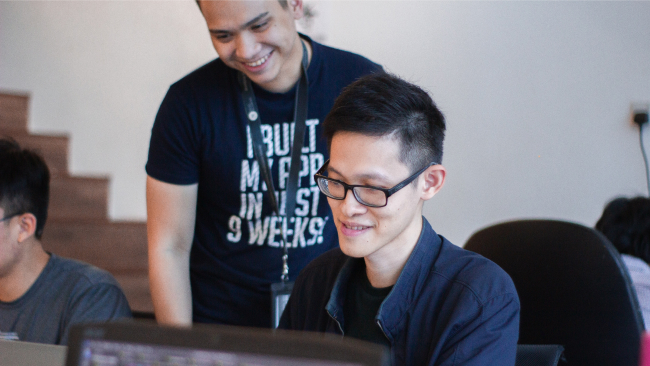
What is mentorship and how does it relate to web development? Is mentorship really a necessity or something you can do without? Where can you find a perfect coding mentor? And is there such a thing as a ‘perfect coding mentor’ anyway? In this piece, we’ll answer all of those questions.
Forget about school or university teachers with their condescending authority based on fear-mongering tactics and aimed at subduing the population of apathetic students. Mentorship is something completely different, something you’ll learn to appreciate through multiple personal investments you’ve made in the process — time, passion, dedication, probably even money. But what’s a mentorship anyway?
What is mentorship?

Mentorship, above all, is a relationship between less and more knowledgeable individuals, where the latter doesn’t necessarily have to be older, but — must possess a certain degree of expertise in the subject of mentorship. Moreover, mentorship is a partnership, usually of two individuals, for learning and development. Mentorship differs from instructorship in a psychosocial sense: it’s not only about giving instructions or teaching in its purest condescending sense, but about psychological support, career guidance, role modeling, inspiration, and communication to foster learning and collaboration.
What is mentorship in web development?
Development mentorship goes beyond teaching the basics of coding, but goes deeper into pragmatic thinking; building real projects that are specifically tailored to your career goals, aspirations, and interests; working on your development portfolio; practicing, sharing, and communicating about your work. There are multiple options for mentorship: you can study one on one, or you can study one on one but with options for connecting with other fellow students within the community at monthly group sessions, or you can study with several people assigned to one mentor or in any other way that suits your learning style.
The role and importance of mentorship in web development

Before we address the practicalities of having a coding mentor, let’s consider some statistics:
One-to-one tutoring is extremely beneficial to all parties, moreover, there’s a great difference in the learning outcomes and cognitive achievements of apprentices and those working on their own or in a group, according to the researchers from MIT, with those who received mentorship excelling at all points.
Being a mentor could boost your own career, according to Sun Microsystems, who outlined in their research that ‘’both mentors and mentees were more than 20% more likely to have gotten a raise than people who didn’t participate in the mentoring program at all.’’
Taking a step further from statistics, let’s summarize the reasons why you would need to have a mentor in the first place:
- When you’re stuck at any particular coding problem, mentors can help you solve it;
- If you’re stuck between two career paths or choices, mentors can help you decide what best suits your personality, knowledge, or interests;
- If you are very slow at achieving your goals, mentors can help accelerate your learning.
- If you need inspiration, mentors can be a great source of new ideas, challenges, and motivation;
- If you need to prepare for coding interviews, mentors can guide you through a set of appropriate challenges and advise on strategies for tackling the most difficult questions.
Therefore, the benefits of having a mentor can range from helping you understand certain coding problems to advancing in your career to passing interviews and finally getting your dream job.
In case you’re asking if there’s any chance to succeed without having a coding mentor, then the answer is yes — if you’re truly dedicated enough, don’t have any questions (which is extremely rare and not always a good sign), know what you’re looking for and aim at, already have a CS degree or just graduated from a bootcamp, then chances are you can get away on your own. However, having a mentor is always nice: there’s no need to reinvent the wheel every single time you’re stuck with a problem or between choices, chances are — somebody has already been there before you. Take all possible chances at landing yourself with a good mentor: you’ll end up wherever you want to be but 5x times faster.
How to find a coding mentor?

Before looking for ways to find a coding mentor, define reasons why you might need one. Depending on those very reasons, you’ll look for different people: some mentors are great in coaching career-wise but wouldn’t help much with algorithmic challenges and vice versa. Also, when choosing a coding mentor, consider their location, time difference, and mentor’s approximate routine or hours of availability.
There are essentially a couple of ways you can search for a mentor:
- On social media: ask people around for recommendations and then contact people suggested to you within your community or network;
- Through your employer: ask your manager for help to find a mentor — they might assign a person from the team, invite a guest mentor, or help find and (most probably) pay for a person for you;
- Google search: there’s a great number of coaching and mentoring websites that offer mentorship services — research each to find out more about the company and decide on the one that feels and seems the most legitimate;
- Ask friends: there’s a high chance that someone you already know has been there before and has used the help of a mentor — find out the details and contact mentors directly;
- Through meetups, conferences, workshops: attend places to network — this way you’ll meet tons of more experienced developers whom you can ask either for mentorship or advice on finding great mentors;
- Coding bootcamps: if you’re one of those coding bootcamp graduates, then ask around if your school offers one-on-one or other mentorship programs, there’s a chance it does.
Challenges of coding mentorship

The people I follow on Twitter oftentimes complain about sexual harassment that comes with coding mentorship in the office. This is obviously one of those challenges that don’t have a simple answer or solution — if you’re working in the office, you should address this issue by confronting the abuser or otherwise by talking to the management, and the latter, of course, is more preferable and safer. If you’re afraid of dealing with the possibility of harassment, just say you’d opt for an online mentorship or have a recommendation from a friend which you’d like to act upon.
Another challenge is actually receiving an unqualified mentor — this one is a little easier to solve — just ask for another person whom you perceive as more knowledgeable or otherwise, ask for an online mentorship, or pick a person whom you can trust or whom you believe is an expert.
Conclusion
Whenever you’re offered a chance to be mentored, just say yes. Mentorship comes with many advantages from accelerating your learning to discovering things you have not even known existed. Speed up your career by accepting and embracing the opportunity to be mentored and learn from others.






